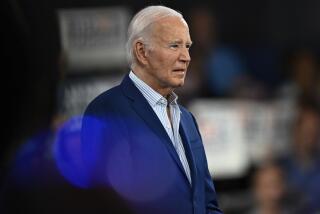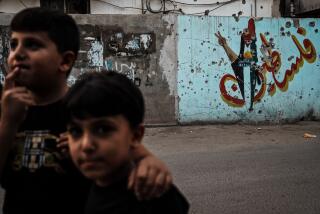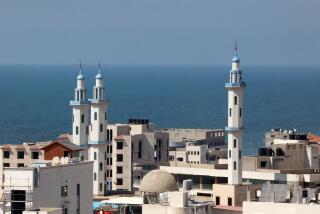Book Review : Traveling With the Islamic Warriors of Afghanistan
- Share via
Under a Sickle Moon: A Journey Through Afghanistan by Peregrine Hodson (Atlantic Monthly: $7.95, paperback, 240 pages)
The allure of “Under a Sickle Moon,” Peregrine Hodson’s account of his travels with mujahedin of Afghanistan, is the same quality that we find in spy novels, tales of the quest and superior travel writing--the fascination of a journey into a strange and beautiful but dangerous place in search of some enormous but elusive truth. Hodson’s book is really a blend of all three, and I was hooked from the first page, where we find Hodson in full disguise, bearing the name Abdul and waiting in some obscure Pakistani border town for the mysterious figure who will conduct him into the company of the mujahedin and their holy war against the Soviet occupiers of their country.
“ ‘Stay here, Abdul. Don’t talk to anyone. Wait for a man called Mahmoud.’ So said my guide, who promptly disappeared into the jostling crowds of men,” Hodson recalls of his first day on the quest. “I squatted by the side of the road with the sun on my back and the smell of wood-smoke in the air but my thoughts were elsewhere: moving between images of Kipling and memories of charades.”
Hodson, a young English attorney and banker, apparently aspired toward an adventure before starting work in “the City.” He secured credentials from a London newspaper and equipped himself with the tools of the post-industrial amateur war correspondent: camera, tape recorder, Swiss Army knife, money belt, pocket Bible, Walkman and audiocassettes: Bach and Bob Dylan, Vivaldi and the Doors. And he embarked on a perilous adventure that placed him squarely in harm’s way: on a march into Afghanistan with a caravan bearing Kalishnikov rifles and anti-tank rockets to be used against the Soviets, in an ambush by a rival faction of mujahedin, under aerial bombardment and commando attack by Soviet troops, and--finally--in a desperate escape from Soviet firepower and the onset of winter across the high peaks of the Afghan frontier.
Politics and Passions
Along the way, Hodson reports in vivid and intriguing detail about the lives and politics and passions of the mujahedin, the harsh beauty of the Afghan hinterland, the geopolitics of the holy war against the Soviet invaders and the theological intricacies of fundamentalist Islam. (He reports too on various incidents of the gastrointestinal distress and other illnesses that afflicted him through his journey, which only adds to the sense of authenticity of “Under a Sickle Moon”--Hodson is no foreign correspondent, but then he is no armchair adventurer, either.)
The early allusion to Kipling, as it turns out, is perfectly appropriate. Hodson is the heir to the fine old tradition of British wanderlust and the British literary impulse toward the “lesser breeds without the Law.” He is heir, too, to a certain condescending and sometimes abusive attitude toward the ragged, impoverished and unsophisticated Afghans whose hard lives and desperate fight he shared for a few months. Still, we may understand such irascibility in a man who was very nearly decapitated by one mujahed who accidentally fired an anti-tank rocket at Hodson while playing with its firing mechanism around the campfire.
“As tactfully as possible I told them that, in England, pointing an anti-tank rocket at a person’s head was a serious breach of etiquette,” Hodson deadpans. “As I was loosening the cords of my pack a mujahed with a disarmingly simian face wandered up to me. ‘Allah faz’l,’ he murmured. ‘God is excellent.’ ”
Feuding in the Ranks
It’s significant that the Atlantic Monthly Press offers Hodson’s book in its “Traveler” series rather than as a work of history or politics. “Under a Sickle Moon” is dated--Hodson’s adventures took place in the fall of 1984--and its reportage tends to be oblique and anecdotal. Still, we learn something important and perhaps surprising from Hodson: The mujahedin are not fighting for democracy in Afghanistan; rather, they are fighting for a semi-feudal Islamic theocracy, and they are prone to fight each other as readily as the Soviets.
In fact, one of the book’s most dramatic and heartbreaking moments is the ambush by which one faction of mujahedin seizes the weapons of another faction in order to threaten yet a third faction! And, tragically, Hodson allows us to understand that the war that some have called “the Soviet Union’s Vietnam” is, in fact, more nearly a war of attrition that the Soviets appear to be winning by using Vietnam-style “search and destroy” missions on the ground and Guernica-style bombardment.
Yet Hodson also allows us to see the simple, fierce and enduring faith that sustains the mujahedin in their suffering and their struggle, which may be the most important lesson of all: “Americans want to make difficulties for the Russians more than they want to help men who are making the jihad. The people of the West think politics are more important than religion. They do not understand Islam,” one mujahed tells Hodson. “We are fighting against men who forget their God for the sake of things of his world.”
More to Read
Sign up for our Book Club newsletter
Get the latest news, events and more from the Los Angeles Times Book Club, and help us get L.A. reading and talking.
You may occasionally receive promotional content from the Los Angeles Times.










